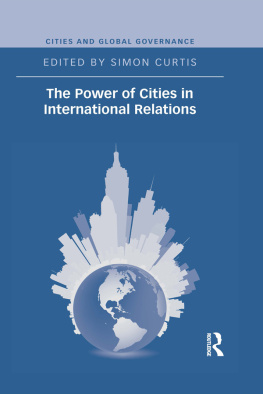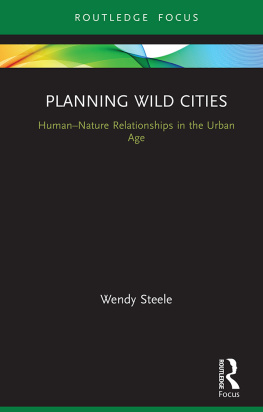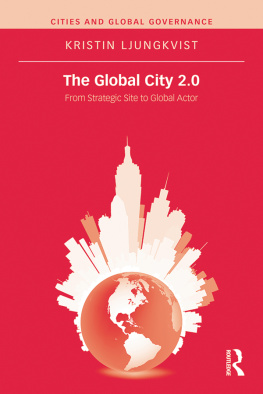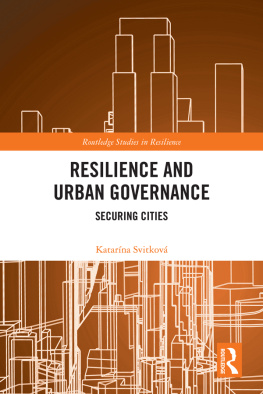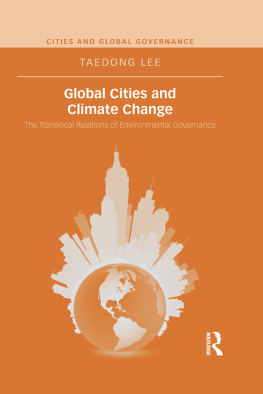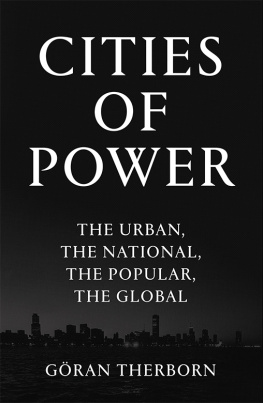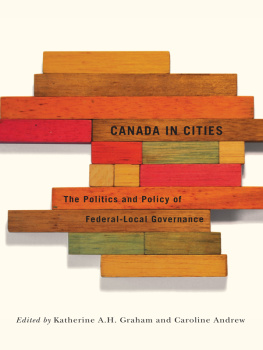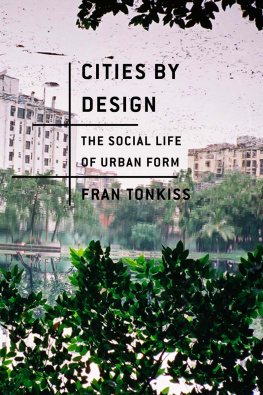The Power of Cities in International Relations
By addressing the political dimension to cities in globalization, this book can be viewed as long overdue, but this does not mean that it lacks maturity in the way its themes are researched. Building upon the largely economic work on global cities, the chapters show how cities are not just actors in current international politics but that they have become integral to both old (high) politics such as security and new politics such as environment. The Power of Cities in International Relations should become a benchmark for understanding twenty-first century international relations.
Peter Taylor, Northumbria University
Cities have become increasingly important to global politics but have largely occupied a peripheral place in the academic study of International Relations (IR). This is a notable oversight for the discipline, although one which may be explained by IRs traditional state centrism, the subjugation of the city to the demands of the territorial state in the modern period, and a lack of conceptual and analytical frameworks that can allow scholars to include the impact of cities within their work.
Presenting case-specific scholarship from leading experts in the field, each contribution guides the reader through the changing nature of cities in the international system and their increasing prominence in global governance outcomes. The book features case studies on the financial power of cities, city action in the security domain, collaboration of cities in coping with environmental problems, transnational urban regions, and mayors as international actors to illustrate if the relationship between the city and the state has changed in profound ways, and how cities are empowered by structural changes in world politics.
The multidisciplinary and global focus in The Power of Cities in International Relations sheds much-needed light on the significance of the reemergence of cities from the long shadow of the nation-state. Only by examining the mechanisms that have empowered cities in the last few decades can we understand their new functions and capabilities in global politics.
Simon Curtis is Lecturer in International Politics at the University of East Anglia. He was previously Michael Leifer Scholar in International Relations at the London School of Economics and Political Science. His research interests are in international theory and international history.
Cities and Global Governance
Edited by Noah J. Toly, Wheaton College
The Routledge series Cities and Global Governance is composed of contributed volumes covering key areas of study at the intersection of urbanism and global governance. Each title explores dimensions of the relationship between the local and the global, between urban landscapes and global dynamics. Authors in the series make empirical and theoretical contribu tions that advance our understanding of the role of cities as sites and actors in global governance.
| 1 Cities, Networks, and Global Environmental Governance | 2 The Power of Cities in International Relations |
| Spaces of Innovation, Places of Leadership | Edited by Simon Curtis |
| Sofie Bouteligier |
First published 2014
by Routledge
711 Third Avenue, New York, NY 10017
and by Routledge
2 Park Square, Milton Park, Abingdon, Oxon OX14 4RN
Routledge is an imprint of the Taylor & Francis Group, an informa business
2014 Taylor & Francis
The right of the editor to be identified as the author of the editorial material, and of the authors for their individual chapters, has been asserted in accordance with sections 77 and 78 of the Copyright, Designs and Patents Act 1988.
All rights reserved. No part of this book may be reprinted or reproduced or utilized in any form or by any electronic, mechanical, or other means, now known or hereafter invented, including photocopying and recording, or in any information storage or retrieval system, without permission in writing from the publishers.
Trademark Notice: Product or corporate names may be trademarks or registered trademarks, and are used only for identification and explanation without intent to infringe.
Library of Congress Cataloging-in-Publication Data
The power of cities in international relations / edited by Simon Curtis.
pages cm. (Cities and global governance)
1. Subnational governmentsForeign relations. 2. International
relations 3. Municipal governmentInternational cooperation.
4. GlobalizationPolitical aspects. I. Curtis, Simon.
JZ4059.P68 2014
327.091732dc23
2013044581
ISBN: 978-0-415-72877-5 (hbk)
ISBN: 978-1-315-85149-5 (ebk)
Typeset in Sabon
by Apex CoVantage, LLC
Contents
by Noah J. Toly
SIMON CURTIS
SIMON CURTIS
KRISTIN LJUNGKVIST
SOFIE BOUTELIGIER
MICHELE ACUTO
NIK JANOS AND CORINA MCKENDRY
IAN MADISON AND EMMANUEL BRUNET-JAILLY
MARK AMEN
ELIZABETH COBBETT
Nations talk, cities act. Despite the hyperbole, this statement by Robert Doyle, Lord Mayor of Melbourne, Australia, is an aptly chosen epigraph for The Power of Cities in International Relations . Editor Simon Curtis has brought together eight creative and rigorous analyses to describe and theorize the agency of cities and transnational municipal networks in global affairs. This volume engages not only the importance of cities as sites for the instantiation of global politics or the role of urban agglomerations as command and control centers in the global economy, but also it focuses on the significance of municipalities as actors on the global stage.
The contributors to this volume give careful attention to three questions: What are the global dynamics that potentiate municipal agency? What are the capabilities and limitations of municipal agency in global politics? Is the relationship between cities and states changing and, if so, how? This volume also asks what light international relations theory can shed upon these developments.
Just as importantly, The Power of Cities in International Relations also begins to interrogate the limitations of international relations theory in accounting for these developments. In doing so, the authors of this volume not only illuminate the agency of cities in global affairs, but also suggest the power of cities to remodel theoretical formulations about the basic conditions for and processes of the global political dynamics in which cities play an increasing role.
Noah J. Toly
Simon Curtis
Nations Talk, Cities Act.
I
Some of the worlds most important cities have been empowered in recent decades. Their empowerment is a reflection of a shift in the nature of world politics. A political form long predating the modern territorial state, the reemergence of the city also indicates that the nature of the state is changing in the contemporary period, as its relationships with other entities undergo profound transformations. Since the era of modern state formation, cities, with few exceptions, have tended to be internalised within the national space and harnessed to the growth of national economies. At the same time, the power of nationalism reoriented older ideas of citizenship away from the original setting of the urban polis to the larger scaled imagined community of the state. Now the direction of these dynamics appears to have been reversed, to some extent at least, as certain cities have emerged from the cage of bounded state space to exhibit novel transnational networked forms and a remarkable vertical and horizontal stretching of urban morphology unmatched at any time in the historical record.

